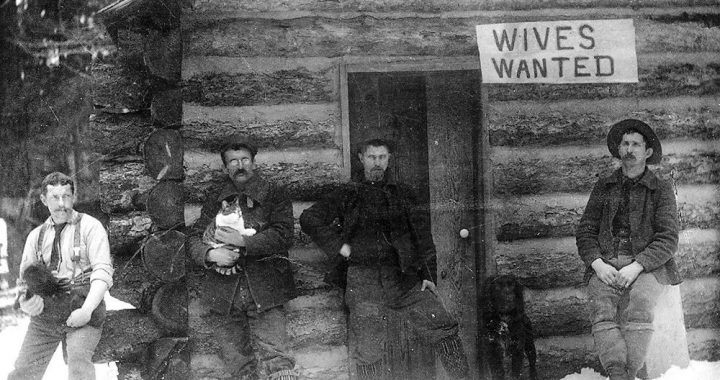As Charlie started to return to consciousness, he recognized the buildings of his small Iowa town on that mid-August day in 1935. From his position, flat on his back in the middle of the main street, he noted the sky was clear, without evidence of rain. Despite this, his farmer’s bones knew that rain was on its way. If only his mind were as intuitive as his bones, it might have warned him of the impending danger he was in last Spring when all of this could have been avoided. The temperature was in the mid 80’s, but for the first time in a long time, he felt relatively cool down here in the dirt. It had been a hot summer with many days over 90 degrees and the entire state needed a break from the oppressiveness of it all. Charlie, more than most. His head slowly began to clear and he noticed a crowd had gathered to gawk. I hate all of them, and this town, and everything that had happened to me here, he suddenly thought to himself. He would leave, he vowed to himself. Maybe go back to Wisconsin where he had lived for a time as a younger man.
Rolling over on his right side he saw his unwilling sparring partner, Bill, also lying in the dirt. Charlie couldn’t quite make out the details, but he knew that Dr. C.S. Stoakes was tending to his face. With great satisfaction he remembered clocking the older man right outside the post office. A clear case of being in the wrong place at the wrong time. Charlie already had a full head of steam built up after his unsuccessful confrontation with the postmaster. How dare he refuse to give him his wife’s forwarding address. She was HIS wife. He had a right to know. Upon leaving the post office, he saw Bill, his former employer and friend. The rumors that he had helped her leave town rang in his head and his anger boiled over. Quickly and deliberately he marched over to him and without warning, swung three roundhouse rights at the 59-year-old until the man went down to the ground with Charlie on top of him, still pummeling him with his fists.
His momentary revery over those punches did not last long. He heard the crunch of footsteps in his left ear, rolled in that direction, and realized that C.D. Kontz, the town’s marshal, was coming for him. Behind him, he could see Olin Smith, manager of the telephone company, who had intervened in the fight to defend Bill. Olin’s right hand was bandaged with blood seeping through the rags. The stain formed the shape of a mouth, Charlie’s mouth. Normally, he would have recognized the seriousness of striking one person and biting another, but the last few months had depleted his sense of reason. Like a caged animal, he was looking for any outlet for the rage that consumed his insides.
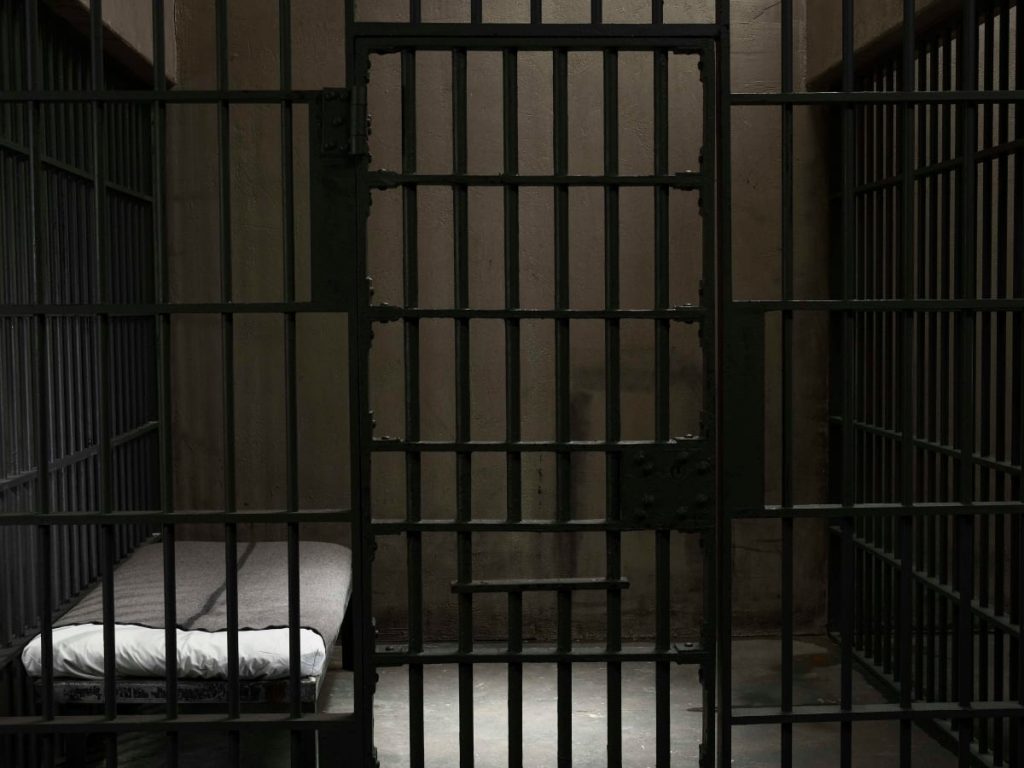
Kontz and a few other men jerked Charlie to a standing position. They half walked; half dragged him to the jail. Mercifully, the Marshal shewed the other men away once Charlie was safely in his cell muttering something about leaving rabid dogs alone. Jail can be a time of reflection but not so in Charlie’s case; not yet anyway. When Mayor B.E.Barkdoll, arrived a couple of hours later to conduct the hearing, he found a man still so full of rage that instead of admitting his own guilt, he insisted on filing charges against Olin for knocking him down and stopping his path to justice. Thankfully, cooler heads prevailed. Barkdoll and Kontz who knew better than most the events of the summer, agreed to leave Charlie in jail overnight and reconvene in the morning when perhaps their old friend’s sense of reason might return to him.
Although he was more subdued in the morning, it did not necessarily bring a return to complete sanity. They let him out of jail anyway. Bill, either as an admission of his own guilt or for another reason, agreed not to press charges. Olin did the same and Charlie walked out into the bright morning sunshine. He headed down the street to his car which was still parked where he left it yesterday. Passing the post office he exchanged glances with postmaster Ralph Schroeder. It occurred to him that Ralph’s face revealed something he had not seen before. For the past two months, the citizens of this town had looked at him with unveiled amusement, pity, and ridicule. He had seen them whispering about him behind cupped hands and newspapers. Ralph’s face had not shown outright fear exactly, but the kind of wariness one wears when encountering an unknown dog and it occurred to him that maybe people were afraid of him now.
He got in the car, started the engine, and began to drive. Where should he go? Anywhere but home. In July, he and his new bride, Margaret, had rented the former Kennedy Studio building from Mrs. Claus Andresen which was far too public for him now. Driving to the eastern edge of town he paused and debated whether he should go south which would take him to his original hometown just a few miles away or north toward the Mooreville area where he had previously rented a farm.

So lost in thought he was surprised when he found himself at Hayward’s Grove sitting in his parked car with no recall of the four mile drive. He sat there now looking at the trees and hills which two months ago had been a patchwork of green and delicate Spring flowers but now was beginning to take on that tired look that the Midwest gets when Fall is near.
For the thousandth time he wondered how things had gone so wrong. In four years, he would be fifty and yet he made a fool of himself like a naïve schoolboy. Being a fool in a small town is like a slow walk to the gallows from which there is no return. Everyone watches and either jeers or cries, but you never get the sweet release of death. You just keep walking; secretly hoping all the while that someone else will do something worse and draw the attention away from you.
Once again, he let his mind drift off to the land of “what ifs”, fully aware how pointless this exercise is. Humans are creatures of habit and Charlie’s habit was to return to that horrible day in 1923 when his world really had shifted off its axis. He had married Minnie on Christmas Eve day in 1912. They were young and the world seemed so full of possibilities then. Charlie met Minnie though her older brother, Alfred, who had married Charlie’s sister, Addie in 1908. The two men had gone into farming together, renting the Stevenson farm five miles north of town in 1909. One big happy extended family.
About three years after their marriage, Charlie and Minnie left Iowa for Clark County, Wisconsin, where he had managed to purchase a farm. Their family grew quickly and within eleven years they had seven children: a new child being born about every year to year and a half. But then, in a heartbeat, everything changed. Minnie died eleven days after giving birth. Overwhelmed with the responsibility of parenting seven children between the ages of 9 and a few days old, Charlie sold the farm, packed Minnie’s body in ice for burial in the Newhall cemetery and returned to Iowa and the support of his family and friends. From that day until now, his life consisted of rented farms and odd jobs all of which was a hard step back from the life they had been building in Wisconsin.
Then, as if all of that had not been enough, came the Great Depression. Charlie had managed to purchase ten acres of land from the former Charles Hill farm where he and his son, Leonard, raised vegetables. They sold the vegetables from their truck garden and took what odd jobs they could find. His children grew up and on to their own lives. In March, Charlie’s dad, Sam, was hospitalized at the University of Iowa Hospital in Iowa City. Two of his brother’s, Albert, and Clarence, went to Iowa City to see their father. When they arrived, they were informed that the old man had already passed away. In a moment of impulse, they decided to jump a train back home and while trying to board the train, Albert slipped under the wheels which severed one of his legs completely and mangled the other. All of that worked together to push Charlie into action to grab a better life for himself before it was too late.
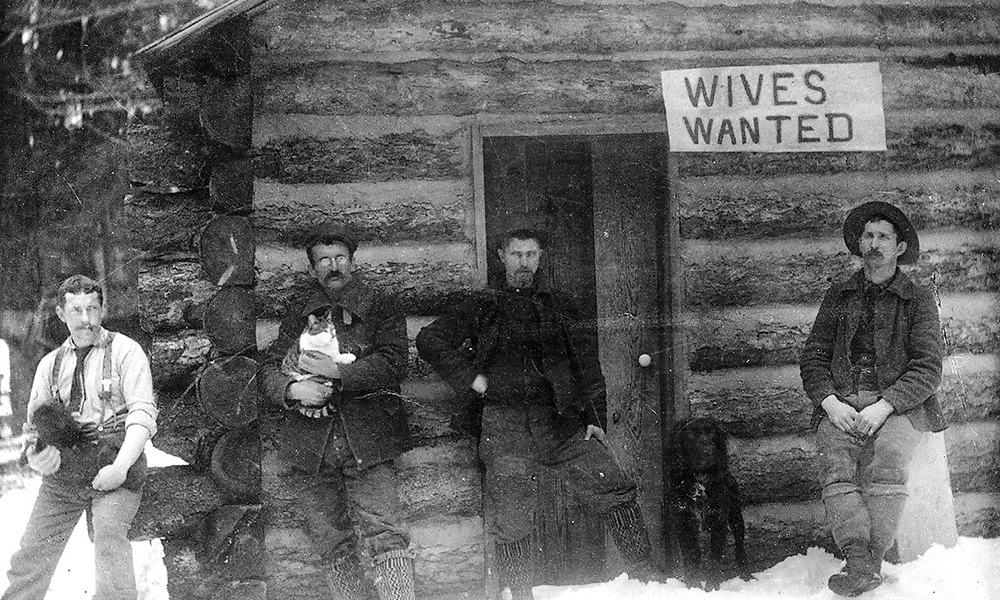
Back in 1912 when he had unexpectedly taken the train to Vinton to marry Minnie, the local paper had said he was one of the town’s most prosperous young farmers, insinuating that he was a good catch. He was painfully aware that no one saw him like anymore. He was 46, alone and had limited prospects. Charlie had wanted what everyone else wanted, the love and companionship of another person. So, Charlie pursued what seemed to him the most logical solution to his problem. Answering a newspaper ad for a matrimonial service out of Missouri, he sent them $10 and received a list of twenty prospective brides. Responding to all twenty, he heard back from three women in different parts of the country. Of these, he had chosen a widow, Mrs. Margaret Ferguson of Little Falls, New York, to be his wife. He proposed to her sight unseen. She had consented and the couple set June 26 as their wedding day.
Sitting here now, he remembers the feeling of elation he had that maybe, finally, his life was going to get better. He became so enthusiastic about his prospects that he placed an ad in the local paper inviting everyone in the area to come to the wedding. It was true that he had wanted the love and companionship of a good wife, but he also had an almost desperate need for some financial security . So, in another completely unexpected move, he decided to raise some cash by charging admission to his wedding. Knowing that people would not want to pay to attend an ordinary wedding, he became determined to turn it into more of an event with games, food and prizes. He printed up handbills and started handing them out all over town.
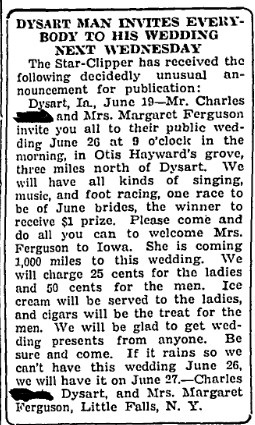
How could he have known that his novel idea would grab the attention of newspapers across the state? Soon, editors were telling the story of Charlie’s “Depression Wedding” from Des Moines to Davenport. Suddenly, Charlie had committed the second most deadly sin of small town living in the Midwest. The one right after making a fool of yourself or being made a fool; he drew attention to himself. A lot of attention.
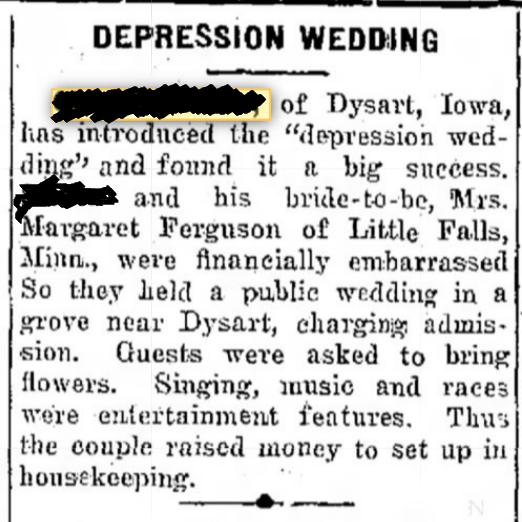
On the day before the wedding, Charlie traveled to Vinton to secure a marriage license. He gave his age as 46 and Mrs. Ferguson’s as 40. He showed a picture of her to the clerk, handed him a handbill, and offered him free admission if he might come to the wedding. From Vinton, he traveled to Iowa City’s bus station where he met Margaret and her eleven-year-old son, Jarvis, and brought them back home. Her older son, James, age 17, hitchhiked the 1000 miles and arrived just in time for the scheduled wedding day. Had she mentioned she was bringing two sons? He could not remember now.
It was a good thing that Charlie had set a contingency plan because on the 26th, it did indeed rain. Finally, at 11 a.m. on the 27th under a bright sunny sky, Charlie and Margaret were married in Hayward’s Grove in front of about 200 people. They had marched through knee-high blue grass to the sounds of the “Bridal Chorus” played by Mrs. Harry Heisler on her accordion. Little Ms. Ramona Reimer acted as ringbearer while her parents Waldo and Viola looked on. All the important people in there lives were there. Charlie’s daughter, Wilma, served as a bridesmaid and Margaret’s son, James, stood up for him as best man. Still, the turnout was much lower than he had hoped for and the take disappointedly small as many did not pay the 25-50 cents he had asked. With his expectations having been so high, he could not hide his disappointment well and this upset many in the town who had never heard of anything so outlandish as paying to attend a wedding. After they had said their “I dos”, Woodrow Pettit and Leo Gulick played their instruments while Katherine Shafer and Mabel Aschenbrenner sang “When the Bluebirds Sing in June” as well as several other favorite tunes. The free cigars and ice cream eventually arrived from town and overall, Charlie thought they had a nice day, although not profitable.
On Friday, a free dance was held in town in their honor after which, Charlie felt that he and Margaret could really start their life together. He rented a house in town where they could be more comfortable. Margaret seemed to be settling in. She spent a few days with Charlie’s daughter in Vinton where James had secured a job at the canning plant. He believed he was finally going to be happy but that was not the case. Shortly after the wedding, he and Margaret had begun to fight. Then, just four weeks after that golden day in Hayward’s Grove, a mysterious car drove up to their house before dawn on a Monday morning. Margaret, James and Jarvis slipped out a side door and into the car which was seen driving out of town at the break of dawn. The rumor mill immediately kicked into high gear with reports that Margaret had received money in the mail and/or been given money by someone locally and Charlie believed that person was Bill. There were rumors that they had moved to Vinton or Indiana or back to New York.
Rumors and insinuations were not what Charlie needed right now. She had made a fool of him. He needed to know where she had gone and why. He needed to know the truth. As he sat looking at the grove of trees which had held so much promise just two months ago, he began to devise a plan to get to the bottom of it. He felt confident that some people in this town knew where she had gone, including the postmaster and Bill, and he was going to find out no matter what.
The conclusion of Charlie’s Story will be published soon! Sign up for our email notifications and you can get it delivered right to your inbox!
